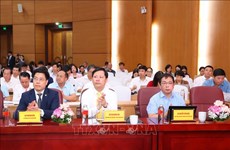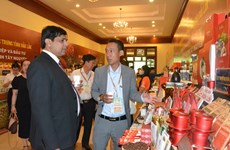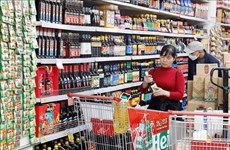Measures to help domestic live-stock feed processers
Over-dependence on imported materials
has caused domestic live-stock feed processers and farmers many
hardships as food price fluctuations directly impact production.
Over-dependence on imported materials
has caused domestic live-stock feed processers and farmers many
hardships as food price fluctuations directly impact production.
At a seminar on the live-stock feed market held in Hanoi on July 17, policymakers and agriculture experts offered analyses and proposed measures to help the agricultural sector overcome difficulties.
First of all, the Husbandry Department under the Ministry of Agriculture and Rural Development asked the Finance Ministry to reduce the value added tax (VAT) on live-stock feed products from the current 5 percent to zero.
Their solution for the long term was to switch fields over to different crops to increase the volume of domestically-made materials for live-stock feed and to increase investment in the feed processing industry.
According to Phan Hong Lien, an official from the Information Centre for Agriculture Development, at present, up to 70 percent of materials for live-stock feed in Vietnam are imported from abroad.
India has been Vietnam’s largest supplier of such materials and followed by Argentina and the US.
Vietnam also imports live-stock feed products, with Thailand being the biggest supplier, followed by China and the US.
Lien said that as a result, prices for live-stock feed in Vietnam are decided by foreign markets.
The centre also noted that domestic businesses are not keen to enter this field, which has a low profit margin and faces stiff competition from imported products.
Tran Xuan Dung, Business Director of the CJVina Agri Co. Ltd., a live-stock feed processing company, said that over the past three years, many Vietnamese enterprises in the field have switched to other products. According to him, the reason was unsuitable tax policies.
These facts present big challenges to the agricultural sector, for which husbandry makes up one quarter of its production value, participants to the seminar agreed./.
At a seminar on the live-stock feed market held in Hanoi on July 17, policymakers and agriculture experts offered analyses and proposed measures to help the agricultural sector overcome difficulties.
First of all, the Husbandry Department under the Ministry of Agriculture and Rural Development asked the Finance Ministry to reduce the value added tax (VAT) on live-stock feed products from the current 5 percent to zero.
Their solution for the long term was to switch fields over to different crops to increase the volume of domestically-made materials for live-stock feed and to increase investment in the feed processing industry.
According to Phan Hong Lien, an official from the Information Centre for Agriculture Development, at present, up to 70 percent of materials for live-stock feed in Vietnam are imported from abroad.
India has been Vietnam’s largest supplier of such materials and followed by Argentina and the US.
Vietnam also imports live-stock feed products, with Thailand being the biggest supplier, followed by China and the US.
Lien said that as a result, prices for live-stock feed in Vietnam are decided by foreign markets.
The centre also noted that domestic businesses are not keen to enter this field, which has a low profit margin and faces stiff competition from imported products.
Tran Xuan Dung, Business Director of the CJVina Agri Co. Ltd., a live-stock feed processing company, said that over the past three years, many Vietnamese enterprises in the field have switched to other products. According to him, the reason was unsuitable tax policies.
These facts present big challenges to the agricultural sector, for which husbandry makes up one quarter of its production value, participants to the seminar agreed./.













